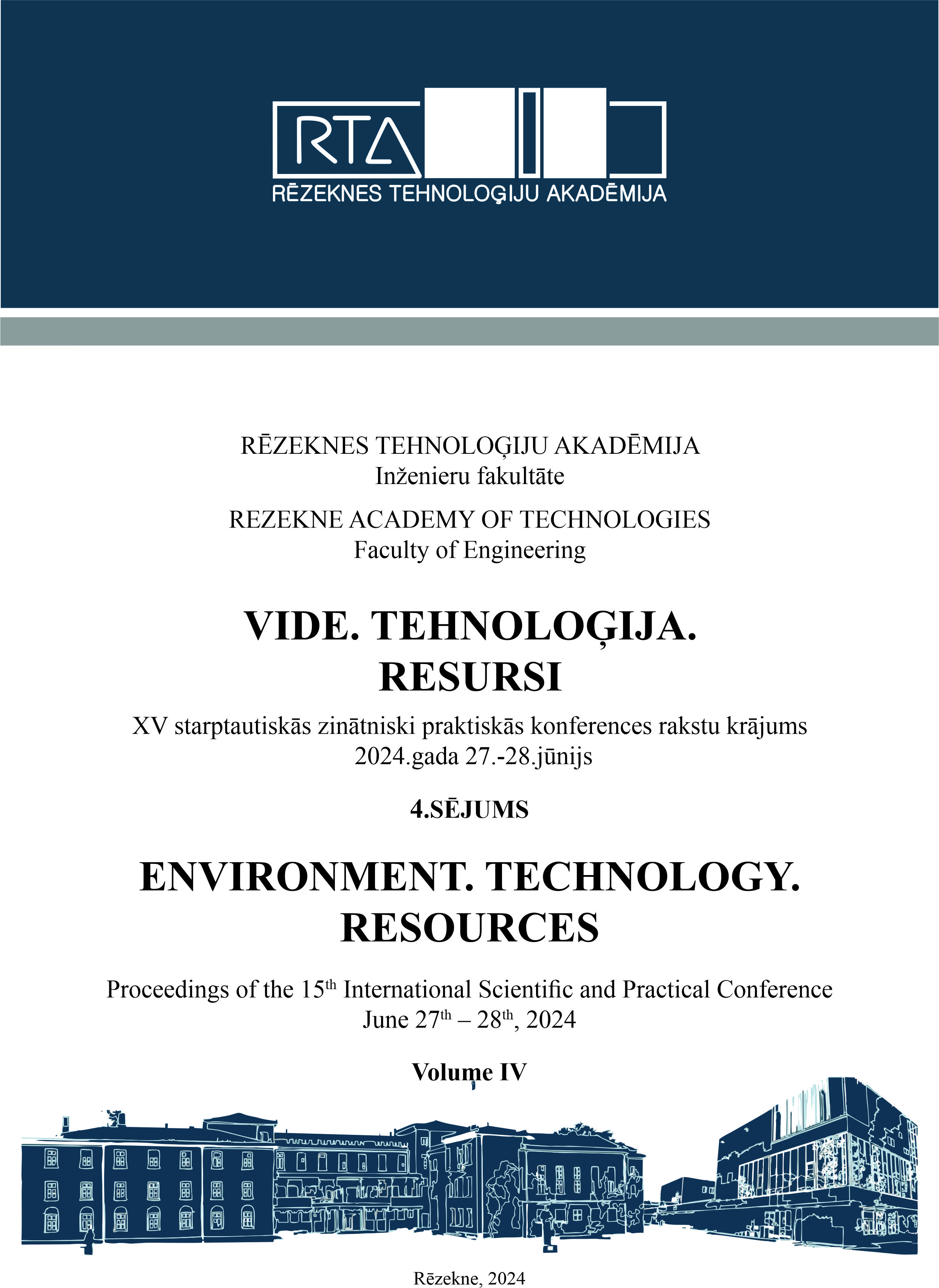THE IMPACT OF SPORTS ACTIVITIES ON THE PSYCHO-EMOTIONAL STATE OF CADETS IN HIGHER EDUCATION INSTITUTIONS DURING WARTIME
DOI:
https://doi.org/10.17770/etr2024vol4.8206Keywords:
anxiety, cadets, depression, emotional control, life satisfactionAbstract
Military personnel with developed psychophysical qualities have a higher likelihood of success in their profession. The development of psychophysical preparedness can help maintain efficiency and health in extreme conditions. Today, there is a need to improve the psychophysical training of security and defense sector personnel in Ukraine. Engaging in sports can be one of the possible ways to enhance the psychophysical preparedness of the personnel in the security and defense sector of Ukraine.
However, differences in psychophysical indicators between cadet-athletes and cadets without sports experience in the conditions of full-scale war have not been determined. This complicates the process of forming recommendations for developing physical training programs for cadets.
Research methods used include theoretical analysis and summarization of scientific-methodical literature and internet data, sociological surveys (questionnaires), and methods of mathematical statistics.
Results have confirmed that sports activities have a positive impact on the psycho-emotional state of cadets: they shape a higher level of life satisfaction, personal stress resistance (without affecting situational anxiety); they increase the ability to control anger without affecting the ability to control emotions of depression and anxiety. Similar tendencies were observed for other psychophysical state indicators, which, however, did not statistically confirm, possibly explained by their heterogeneity.
It can be recommended to engage in sports for the correction of the psychophysical state of cadets in higher education institutions during wartime conflicts.
References
S. K. Crowley, L. L. Wilkinson, L. T. Wigfall, A. M. Reynolds, et al. “Physical Fitness and Depressive Symptoms during Army Basic Combat Training”, Medicine & Science in Sports & Exercise, vol. 47, no. 1, pp. 151–158, 2015. https://doi.org/10.1249/MSS.0000000000000396
V.V. Pichurin, “Psychological and psycho-physical training as a factor of personal anxiety at students” Pedagogics, psychology, medical-biological problems of physical training and sports, no. 3, pp. 46–52, 2015. doi:10.15561/18189172.2015.0307
V. Ziaee, S. Lotfian, H. Amini, M.A. Mansournia, A.H. Memari “Anger in Adolescent Boy Athletes: a Comparison among Judo, Karate, Swimming and Non Athletes”. Iranian Journal of Pediatrics, vol. 22, pp. 9–14, 2012
G. Zieliński, A. Byś, M. Baszczowski, M. Ginszt, et al. „The influence of sport climbing on depression and anxiety levels – literature review”, Journal of Education, Health and Sport. vol. 8, no. 7, pp. 336–344, 2018.
K. Prontenko, G. Griban, V. Prontenko, F. Opanasiuk, et al., “Health improvement of cadets from higher military educational institutions during kettlebell lifting activities”, Journal of Physical Education and Sport. 2018; vol. 18, no. 1, pp. 298–303.
I. M. Mazur, G. V. By`kova, S. M. Kozenko, Yu. M. Kornijchuk, ta in. “Dynamics of mental processes in cadets under the influence of physical training and sports ”. V: Naukovy`j chasopy`s NPU imeni M. P. Dragomanova. Zb. nauk. pr., vol. 5, pp. 125, 2020. https://doi.org/10.31392/NPUNC.SERIES15.2020.5%28125%29.18
F. Szabo. “Do combat sports develop emotional intelligence?”, Kinesiology, vol. 46, no. 1, pp.53–60, 2014.
S. Palevych, О. Poddubny, О. Tkachuk, Z. Tzymbaliuk, “Using mathematical criteria of evaluation for diagnostics results of cadets’ training in affective sphere”, Health, Sport, Rehabilitation, vol. 5, no. 1, pp. 96–106, 2019. https://doi.org/10.34142/HSR.2019.05.01.11
M.O. Yarmol`chyk, “Aggression and anxiety as determinants of the choice of coping strategies of military personnel during decompressionyi”. Social`na psy`xologiya; psy`xologiya social`noyi roboty`. Vcheni zapy`sky` TNU imeni V. I. Vernads`kogo. Seriya: Psy`xologiya, vol. 32, no. 71, pp.109–114, 2021. https://doi.org/10.32838/2709-3093/2021.2/19
M.F. Crane, D. Boga, E. Karin, D.F. Gucciardi, F. Rapport, J. Callen, L. Sinclair. “Strengthening resilience in military officer cadets: A group-randomized controlled trial of coping and emotion regulatory self-reflection training”. Journal of Consulting and Clinical Psychology, vol.87, no. 2, pp. 25–40, 2019. https://doi.org/10.1037/ccp0000356
D. Nasioudis, L. Palaiodimos, M. Dagiasis, et al. “Depression in military medicine cadets: a cross-sectional study”, Military Med Res. vol. 2, no. 28, 2015. https://doi.org/10.1186/s40779-015-0058-x
I. Bodnar, A. Andres, V. Kryzhanovskyi, V. Shvets. “The influence of sports on emotional control in cadets of the national guard оf ukraine at the beginning of the war”. Health Problems of Civilization, vol. 17, no. 3, pp. 269-276, 2023. https://doi.org/10.5114/hpc.2023.128805
E. Diener. “Assessing Well-Being: Review of the Satisfaction With Life Scale. The Collected Works of Ed Diener”, Social Indicators Research Series 39, https://doi.org/10.1007/978-90-481-2354-4 5
N. Krushyns`ka, I. Kogut, “The influence of jogging on the stress level of combatants”. Theory and methodology of physical education and sports. no. 4, pp. 37–41. 2022.
G. Uludağ, H. Taşdöven, M. Dönmez, “Polis Adaylarının Mesleki Kaygı Düzeylerinin Çeşitli
Değişkenler Açısından İncelenmesi”, Сurrent Perspectives in Social Sciences, vol. 18, no. 2, pp. 75–94, 2014.
D. Nasioudis, L. Palaiodimos, M. Dagiasis, et al. “Depression in military medicine cadets: a cross-sectional study”, Military Med Res., vol. 2, no. 2, 2015. https://doi.org/10.1186/s40779-015-0058-x
E. Diener, R. Emmons, R. Larsen, S. Griffin. “The Satisfaction With Life Scale”. J Pers Assess. Feb; vol. 49, no. 1, pp.71-5. 1985. doi: 10.1207/s15327752jpa4901_13.
M. Watson, S. Greer. “Development of a questionnaire measure of emotional control”. J Psychosom Res.; vol. 27 no. 4, pp. 299-305. 1983. doi: 10.1016/0022-3999(83)90052-1.
C. Spielberger, S. Sydeman. "State-Trait Anxiety Inventory and State-Trait Anger Expression Inventory". In Maruish, Mark Edward (ed.). The use of psychological testing for treatment planning and outcome assessment. Hillsdale, NJ: Lawrence Erlbaum Associates. pp. 292–321. 1994.
Downloads
Published
Issue
Section
License
Copyright (c) 2024 Andrii Andres, Nataliia Sorokolit, Andrii Mandiuk, Olha Rymar, Olena Khanikiants

This work is licensed under a Creative Commons Attribution 4.0 International License.



